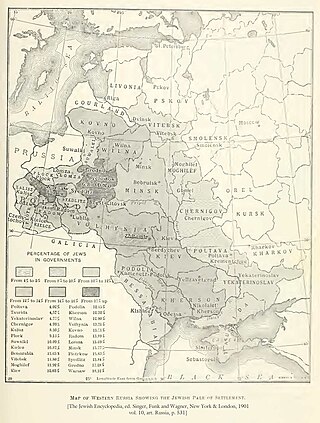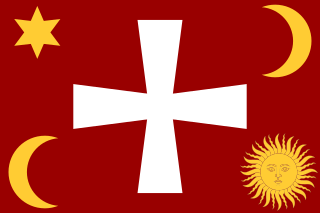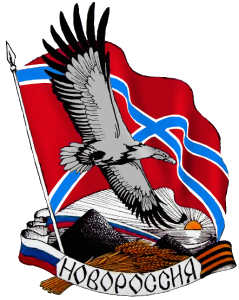
The Pale of Settlement was a western region of the Russian Empire with varying borders that existed from 1791 to 1917 in which permanent residency by Jews was allowed and beyond which Jewish residency, permanent or temporary, was mostly forbidden. Most Jews were still excluded from residency in a number of cities within the Pale as well. A few Jews were allowed to live outside the area, including those with university education, the ennobled, members of the most affluent of the merchant guilds and particular artisans, some military personnel and some services associated with them, including their families, and sometimes their servants. The archaic English term pale is derived from the Latin word palus, a stake, extended to mean the area enclosed by a fence or boundary.

The Zaporozhian Sich was a semi-autonomous polity and proto-state of Cossacks that existed between the 16th to 18th centuries, including as an autonomous stratocratic state within the Cossack Hetmanate for over a hundred years, centred around the region now home to the Kakhovka Reservoir and spanning the lower Dnieper river in Ukraine. In different periods the area came under the sovereignty of the Polish–Lithuanian Commonwealth, the Ottoman Empire, the Tsardom of Russia, and the Russian Empire.

Zaporizhzhia or Zaporozhzhia is a historical region in central east Ukraine below the Dnieper River rapids, hence the name, literally "(territory) beyond the rapids".

Nariman Karbalayi Najaf oghlu Narimanov was an Azerbaijani Bolshevik revolutionary, writer, publicist, politician and statesman. For just over one year beginning in May 1920, Narimanov headed the government of Soviet Azerbaijan. He was subsequently elected chairman of the Union Council of the Transcaucasian SFSR. He was also Party Chairman of the Central Executive Committee of the Soviet Union from 30 December 1922 until the day of his death.
Russians are the largest ethnic minority in Ukraine. This community forms the largest single Russian community outside of Russia in the world. In the 2001 Ukrainian census, 8,334,100 identified as ethnic Russians ; this is the combined figure for persons originating from outside of Ukraine and the Ukrainian-born population declaring Russian ethnicity.

The Wild Fields is a historical term used in the Polish–Lithuanian documents of the 16th to 18th centuries to refer to the Pontic steppe in the territory of present-day Eastern and Southern Ukraine and Western Russia, north of the Black Sea and Azov Sea. It was the traditional name for the Black Sea steppes in the 16th and 17th centuries. In a narrow sense, it is the historical name for the demarcated and sparsely populated Black Sea steppes between the middle and lower reaches of the Dniester in the west, the lower reaches of the Don and the Siverskyi Donets in the east, from the left tributary of the Dnipro — Samara, and the upper reaches of the Southern Bug — Syniukha and Ingul in the north, to the Black and Azov Seas and Crimea in the south.

Oleg Anatolyevich Tsaryov is a Ukrainian and Russian businessman, politician and former separatist official in eastern Ukraine.

Novorossiya Governorate, was a governorate of the Russian Empire in the previously Ottoman and Cossack territories, that existed from 1764 until the 1783 administrative reform. It was created and governed according to the "Plan for the Colonization of New Russia Governorate" issued by the Russian Senate. It became the first region in Russia where Catherine the Great allowed foreign Jews to settle.

From the end of February 2014, demonstrations by Russian-backed, pro-Russian, and anti-government groups took place in major cities across the eastern and southern regions of Ukraine in the aftermath of the Euromaidan and the Revolution of Dignity, which resulted in the ousting of Russian-leaning President Viktor Yanukovych. The unrest, which was supported by Russian military and intelligence, belongs to the early stages of the Russo-Ukrainian War.

Pavel Yuryevich Gubarev is a Ukrainian-born Russian political figure and soldier, primarily known for his activities in Donbas in 2014.

The People's Militia of the Donetsk People's Republic and People's Militia of the Luhansk People's Republic are pro-Russian paramilitaries in the Donbas region of eastern Ukraine, under the overall control of the Russian Federation. They are also referred to as Russian separatist forces or Russian proxy forces. They were affiliated with the self-declared Donetsk People's Republic (DPR) and Luhansk People's Republic (LPR) during the war in Donbas (2014–2022), the first stage of the Russo-Ukrainian War. They then supported the Russian Armed Forces against the Ukrainian Armed Forces during the 2022 Russian invasion. In September 2022, Russia annexed the DPR and LPR, and began integrating the paramilitaries into its armed forces. They are designated as terrorist groups by the government of Ukraine.

The New Russia Party, or Novorossiya Party, is a political party operating in Ukraine, and in particular regions of Ukraine annexed by Russia The organization was founded by pro-Russian separatists, under the leadership of Pavel Gubarev, on 14 May 2014. The party is formally known as the Social-Political Movement "New Russia Party". It is not registered with the Ministry of Justice of Ukraine.
Novorossiya or New Russia, also referred to as the Union of People's Republics, was a project for a confederation between the self-proclaimed Donetsk People's Republic (DPR) and the Luhansk People's Republic (LPR) in Eastern Ukraine, both of which were under the control of pro-Russian separatists.
A variety of social, economical, cultural, ethnic, and linguistic factors contributed to the sparking of unrest in eastern and southern Ukraine in 2014, and the subsequent eruption of the Russo-Ukrainian War, in the aftermath of the early 2014 Revolution of Dignity. Following Ukrainian independence from the Soviet Union in 1991, resurfacing historical and cultural divisions and a weak state structure hampered the development of a unified Ukrainian national identity.

Novorossiya is a historical name, used during the era of the Russian Empire for an administrative area that would later become the southern mainland of Ukraine: the region immediately north of the Black Sea and Crimea. The province fell largely within a slightly wider area known in Ukrainian as the Stepovyna "Steppe Land", or Nyz "Lower Land". The name Novorossiya, which means New Russia, entered official usage in 1764, after the Russian Empire conquered the Crimean Khanate, and annexed its territories, when Novorossiya Governorate was founded. Official usage of the name ceased after 1917, when the entire area was incorporated in the Ukrainian People's Republic.

Russian irredentism, sometimes expressed by the term Greater Russia, refers to territorial claims made on behalf of the Russian Federation to parts of the former Russian Empire and/or the former Soviet Union. It seeks to politically incorporate Russians who are living in territories that fall outside of Russia's modern borders.
The National Council of Bessarabia was a separatist organisation was headed by Dmitriy Zatuliveter, of the previously obscure Organization of Transnistrians in Ukraine. It arose in 2014, following the Russian military intervention in Ukraine.

Free Donbas is a public movement and political bloc in the Donetsk Oblast fighting for the separation of the region from Ukraine. The bloc includes several parties and movements. The organization was formed in 2014, in the first six months after the proclamation of independence of the Donetsk People's Republic from Ukraine. Satisfying the requirements of the CEC, this party became one of two admitted to participation in the general elections in the Donetsk People's Republic on November 2, 2014. After registration, the party joined in campaigning in the streets with voters, and also on the Internet. The party supports the independence of the historical and cultural region of Novorossiya from Ukraine.
Velyka Bilozerka is a rural locality (selo) in Vasylivka Raion, Zaporizhzhia Oblast in Ukraine. Before July 18, 2020 it served as the administrative center of Velyka Bilozerka Raion, which was abolished. The population in 2018 was 8339.
This is a list article about flags that have been used by pro-Russian separatists in Ukraine and in areas occupied by Russia and Russian-controlled forces during the Russo-Ukrainian War.













